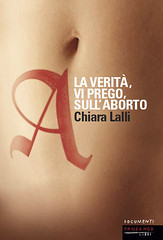Un commento di Anna Smajdor («The egg and sperm race», BioNews, 7 novembre 2006) sul caso di Alexandra Saunders, una donna inglese che ha deciso di vendere i propri ovociti su Internet per ripagare alcuni debiti, presenta molti spunti degni di riflessione:
Laura Witjens, a spokesman for the National Gamete Donation Trust is quoted as saying in response to Ms Saunders’ plan to sell her eggs online, that more women should be willing to donate altruistically. But why should they? Women who donate eggs undergo a gruelling regimen of drugs, followed by a surgically invasive harvesting procedure. These interventions are not risk-free: several women have died from the side-effects of the drugs involved. Witjens rightly says that women who donate solely for money put their health at risk. But women who donate altruistically also put their health at risk – and get nothing in return!
Many clinics recommend that female patients who require egg donation become pro-active in their search for donors. Friends and family members are regarded as being good potential sources who will require no payment. But do we really think that women sought out by desperate friends and relatives as potential donors are more objective, more realistic, less coerced than those who make the decision primarily for financial reasons? I don’t mean here to belittle the sacrifice made by altruistic donors. But I think we kid ourselves if we think that somehow coercion is not at issue here simply because money is not involved.
This problem of coercion also arises in the context of ‘egg-sharing’, a means by which women can currently ‘pay’ for fertility treatment by ‘sharing’ their eggs with other infertile women (or, in some cases, by donating eggs for research). Guido Penning in a previous BioNews commentary suggests that some women’s drive to have a child results in their agreeing to egg-sharing despite serious misgivings. The point here is that coercion is an issue whether or not it is cash which is the incentive. We allow other incentives to operate in the market place for gametes in the UK, but have denied that there is such a market.
These denials tend to centre round a distaste for commodification, and concern for the wellbeing of donors. However, I suggest that since commodification is rife, we consider whether we are really protecting donors or our own sensibilities. As soon as we admit that there is a market for gametes, we open the possibility of regulating it, of ensuring fair prices, and of reducing the likelihood that people will go abroad for unregulated services where the scope for exploitation is even greater.
Finally, there is of course a broader ethical issue here. The procurement of gametes is hedged about with taboos, two of the strongest of these being masturbation, and the violation of bodily integrity. Technology has enabled us not only to covet, but to obtain our neighbours’ gametes. Is doing so ethically acceptable? This is the question at the heart of our unease about egg donation, but it has been eclipsed in a prudish scramble to pretend that at least we are not paying for doing so.


























Nessun commento:
Posta un commento